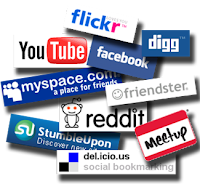@Ping-TechTips
Arguably the most significant advancement of the 21st century, social
media has had a profound impact on our lives. But has it improved our
lives? It is a question with a philosophical ring and one that opens up a
host of other queries.
First we must analyse the conveniences and abilities social media has given us.
Social Impact
If one was to measure the noteworthiness of broadband by calculating
the amount of time spent on specific elements, than social media would
come out on top. Facebook boasts 700 million users and Twitter 500
million, together amassing 1.2 billion users.
That’s one out of every
seven human beings alive on earth and this doesn’t even take into
consideration the numbers conversing online through Google+ and what
not.
It isn’t just how many social media users there are on Earth however
that indicates how much an influence it has had on our lives. It is the
amount of time such a large proportion of the human population spends on
these sites. A study late last year concluded that one out of every
seven minutes online are spent on Facebook, while similar figures are to
be expected with Twitter.
Psychological Impact
However, has this actually improved our lives? A report by published
in the Guardian in mid-March established a correlation between Facebook
usage and levels of obsessions with self-image, shallow friendships and
being a socially disruptive narcissist. The theory was that the social
media site had become a platform for empty self-expression and
popularity contesting.
Political Impact
Social media does have its benefits of course. One would have to look
no further than the Arab Springs to identify these. The platform’s
ability to organise and mobilise protests has been cited as the catalyst
behind the Arab protests that saw the overthrow of prominent dictators
throughout the Middle East. These uprisings were branded ‘Twitter Revolutions’ and
it is supposed that the ability to network and spread news through
social media sites helped the protests spread in a way that would not
have been possible otherwise.
While one cannot exactly obtain a broadband speed test and
determine the connection levels in the countries involved in the Arab
Spring at the time; it is accepted that high speed connections were
available in the right places throughout the Middle East. This increases
the likelihood of social media having a fundamental role to play in the
uprisings.
However, it has also been suggested that the impact of social media
on these revolutions has been overstated, particularly in the Western
media. This logic argues that there were large scale revolutions before
social media, indicating that the protests would have spread regardless
and had similar impact.
In truth, it is likely that social media did play some role, although
the extent of this role has been overstated. Nevertheless, that it was
impactful in the toppling of unjust regimes and tyrannical governments
is a credit to the existence of social media.
Although, the role social media has to play in the art of uprising
can have negative effects if the cause is unwarranted and unjustifiable.
The riots that shook Britain in 2011 were helped on by social media,
which allowed the organisation of rebellions to occur.
Such negative aspects have however brought about positives as many
rioters – who used social media to arrange and express their involvement
in looting sessions – were soon easily tracked down by the police.
What Constitutes an Improvement to Our Lives?
Upon deliberation, the question of whether or not social media has
improved our lives is somewhat unanswerable without knowing the full
meaning of life. What is improvement for something you do not know the
nature of?
What can be said is that social media has changed our lives and made
many aspects incredibly more convenient. But that is all that can be
said.
